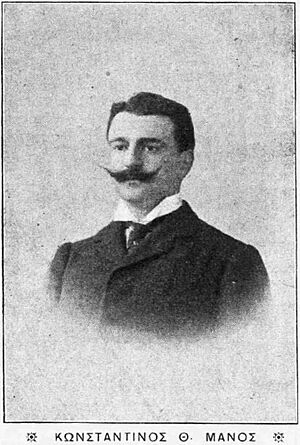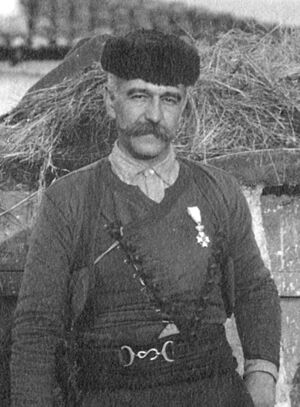Konstantinos Manos facts for kids
Quick facts for kids
Konstantinos Manos
|
|
|---|---|
| Κωνσταντίνος Μάνος | |
 |
|
| Mayor of Chania | |
| In office 1900–1902 |
|
| Governor | Prince George (as High Commissioner) |
| Personal details | |
| Born | 1869 Athens, Kingdom of Greece |
| Died | 4 April 1913 (aged 44) Langadas, Kingdom of Greece |
| Relations | Petros Manos |
| Parent | Thrasyvoulos Manos |
| Alma mater | Leipzig University Oxford University |
| Occupation | Revolutionary Soldier Poet Politician Sportsman |
| Awards | |
| Military service | |
| Allegiance | |
| Branch/service | |
| Battles/wars |
|
Konstantinos Manos (1869–1913) was a famous Greek person. He was a politician, a poet, a soldier, and a sportsman. He even served as the mayor of Chania for a time.
Contents
Konstantinos Manos: A Greek Hero
Early Life and Education
Konstantinos Manos was born in Athens in 1869. His family was very important in Greek history. His father, Thrasyvoulos Manos, was a military officer. His mother, Roxani Mavromichalis, also came from a well-known family.
Konstantinos was the older brother of Petros Manos. He studied law at Leipzig University and philosophy at Oxford University. He even taught Empress Elisabeth of Austria.
Military and Political Actions
Konstantinos Manos was a brave soldier and a dedicated politician. He fought for Greece's freedom and rights.
Fighting for Crete
In 1896, the Cretan Revolution began. Konstantinos went to Crete and led a special group of fighters called the Holy Corps. After some difficulties, he left Greece for a while and traveled to places like Alaska.
He later returned to Crete. From 1900 to 1902, he was the mayor of Chania.
Other Important Fights
Konstantinos Manos's fighting spirit didn't stop in Crete. He also took part in the Macedonian Struggle. He used a secret name, Michailidis, to help the cause.
In 1905, he joined the Cretan assembly of Therissos. He disagreed with Prince George, who was in charge of the Cretan State. In 1909, he was part of the Goudi Coup, a military uprising. After this, he became a representative in the Greek parliament.
Balkan Wars and His Death
During the First Balkan War, Konstantinos led a group of volunteers from Crete. They fought in the Epirus region. His group helped free the city of Preveza.
Sadly, Konstantinos Manos died on April 4, 1913. He was killed when his plane crashed during a scouting flight. He was only 44 years old.
Literary Achievements
Even though he died young, Konstantinos Manos wrote many poems. He published them in a collection called Words of the Heart. This book won an award in a competition.
He also helped bring the everyday language, called vernacular, into Greek literature. In 1905, he translated Sophocles' play Antigone into this simpler language. This was a very new idea for his time.
Sports and the Olympics
Konstantinos Manos was very involved in sports. He believed that hosting the first modern Olympic Games in Athens in 1896 was a great chance for Greece.
The then-future King Konstantinos was the head of the National Olympic Committee. He saw Konstantinos Manos's skills and made him the general secretary. Konstantinos Manos was the first person to donate money for the Olympic Games. He gave a large amount of 10,000 drachmas. He also started the "Athens Athletic Club."
Manos strongly believed that sports should be for amateurs, not professionals. He wrote the first rules for games, which said that professional athletes could not compete. This caused some arguments in the sports world. Many gymnasts were upset because they were excluded from the games.
In 1904, Konstantinos Manos was removed from the National Olympic Committee. This happened because he missed three meetings. However, the real reason he was absent was that he was in Turkish prisons. He had gone to Western Macedonia to lead the Macedonian Struggle and was captured. He was released in 1905. This showed that he was no longer favored by the royal family.
 | Toni Morrison |
 | Barack Obama |
 | Martin Luther King Jr. |
 | Ralph Bunche |


